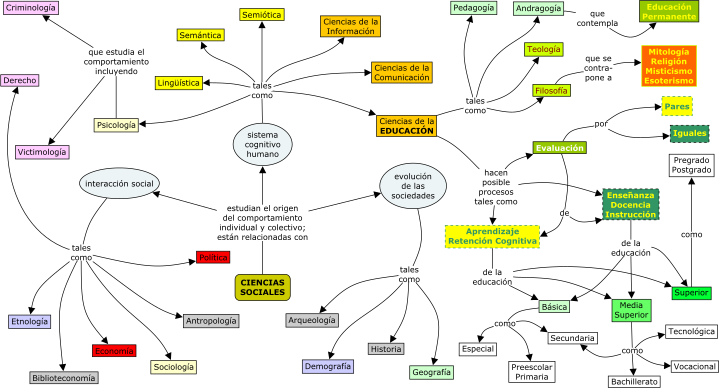Education sciences- John Dewey
The Sciences of the Education are all the disciplines interested in the scientific study of the different aspects of education in certain societies and cultures. Some of the most significant are: Sociology of Education, Economics of Education, Anthropology of Education, History of Education, Psychology of Education, Teaching Pedagogy, Philosophy of Education, Comparative Education and Education Policy.
Features
The Education Sciences are a type of set of disciplines that study, describe, analyze, explain and understand educational phenomena in their multiple aspects. Education is a complex phenomenon that takes place in all areas of social life in which different disciplines of Social and Human Sciences intervene such as Sociology, Law, Psychology, Political Science, History, Anthropology, Economics, Philosophy; that make specific approaches and studies so it is possible to speak of a Sociology of Education, a History of Education, an Anthropology of Education, an Educational Psychology, an Educational Policy, Education Economics and a Philosophy of Education. All those disciplines that explain the educational phenomena, which can be integrated to carry out studies on the educational fact, nourish the field of Education Sciences.
The object of the Sciences of the Education of the rigorous scientist
If this is a study of past, present and future educational situations. The main factors that must be taken into consideration to analyze and understand facts and educational situations can be classified into two broad categories:
- The factors that depend on the general conditions of the educational institution within the society.
- The factors that depend on the "local" conditions of the educational institution and that determine its realization.
Classification of the Sciences of the Education
The pedagogue Gastón Mialaret proposed in his book The Sciences of Education in the late seventies a classification in three major categories:
1 . Those that study the general and local conditions of education:
- History of education and pedagogy.
- Sociology of Education.
- School demography.
- Economy of education.
- Compared pedagogy.
2 . Those who study the educational situation and educational facts:
- The disciplines that study the conditions of the educational act from the angles:
- Of physiology.
- The psychology of sociology education
- Communication Sciences.
- The didactics and the theory of the programs.
- The sciences of methods and pedagogical techniques.
- The sciences of evaluation
3 . Those of reflection and future:
- The philosophy of education.
- The educational planning.
The debate between Pedagogy and Education Sciences
In the debate between Pedagogy and Education Sciences the positions of the French sociologist and pedagogue Emile Durkheim and the American philosopher, educator and educator John Dewey stand out.
For Durkheim pedagogy is a theory-practice, a way of reflecting on education, these reflections take the form of theories, which are combinations of ideas, whose purpose is to direct action, considers necessary to Pedagogy because it guides, but can not be confused with science. That is why it postulates that a Science of Education should be developed, which would try to describe, analyze, interpret and explain, past or present facts, in which it investigates its causes or effects.
The Science of Education has not yet been elaborated and, as long as it is not elaborated, it will be the knowledge of other social disciplines, the base on which the pedagogy is sustained; no longer in a knowledge of speculative, scholastic type, but in a scientific knowledge, because that technology must possess a basic scientific knowledge to be applied. From Durkheim's perspective, the study of education can be considered a scientific discipline, the science of education, since it possesses the three characters of science: 1) It refers to observable facts. 2) They are facts that can be categorized, they are not isolated. 3) Seek to know those facts in a disinterested way, and without judging them (neutrality): a methodological rule is to eliminate prejudices. The science of education can study two types of problems: that of the genesis and the functioning of educational systems.
This contribution of Durkheim is the one that will lay the foundations for the emergence of the sociology of Education with Parson, in as much, it conceives to the education like a social fact, that prepares to the younger generations for the social life. Education, in these terms, deserves to be studied by Sociology, understood as education as a process of socialization, which prepares subjects to become members of the social order.
For his part for John Dewey, is going to deal specifically with the problem of education, focusing on how it should be linked to reality, philosophy or theory, and not be pure reflection. It raises the possibility of a Science of Education, which must be a pragmatic, positivist and scientific knowledge, for it must take contributions from Sociology, Psychology and Economics. Dewey, does not speak of an Education Science apart from these disciplines, but that the Science of Education is going to be constituted with the contribution of the same ones.
The way in which he conceives the Science of Education is very close to Durkheim's conception of pedagogy, as theory-practice. This idea is reaffirmed if one takes into account that, for Dewey, there is no separation between Science and Philosophy of education.
Different academic traditions
The naming and characterization of the disciplinary approach is problematic, since several sciences assume the capacity to understand the object of education. In the morphology of the academic field it is possible to distinguish different denominations Pedagogy, Sciences of Education and Education.
German tradition: Pedagogy as Science of Education
The German tradition supports the need for a disciplinary unit, chaired by philosophy as a normative source linked to the tradition of idealist and historicist philosophy, conceived the possibility of constituting Pedagogy in the science of education. Pedagogy studies the educational phenomenon with the intention of guiding its practical development above all at a normative level; reflects on educational problems based on ideological and philosophical commitments.
French tradition: The Sciences of Education
The French tradition defends the need to sustain the multidisciplinarity (or multireference) with respect to the object of education, using the name of Educational Sciences. Starting from the distinction formulated particularly by Durkheim (1858-1917), it differentiated in its beginnings the Pedagogy of the Sciences of the Education.
Anglo-Saxon Tradition: Theory of Education
Characterized by an evolutionary, empiricist and pragmatic view, it frames as a science an educational theory deeply related to experimental psychology and functionalist sociology. The Anglo-Saxon tradition unites under the name education the practice and the discipline that studies it, conceive the need for a theoretical discourse that at the same time a practical bet.
Some Sciences of Education
- Philosophy of Education.
- Sociology of Education.
- Psychology of the education.
- Economy of Education.
- Anthropology of Education.
- Comparative Education.
- Educational Policy.
- Educational Administration.
- Pedagogy.
Problems and critics to the Sciences of the Education
The Spanish pedagogue Agustín Benito Escolano, highlights that the sciences of education, revolve around the following problems:
- The meaning of the plurality and positivity of the education sciences.
- Problems of unity and interdisciplinarity.
- Relations between Philosophy and Education Sciences within the framework of contemporary epistemological discussions.
In this sense José Gimeno Sacristán has emphasized that the sciences of education today are several small theories without internal coherence, and without a theoretical framework of their own (since they have taken things from other sciences). They are inconclusive not only because they are sciences, but also because they are innovative in culture. The sciences of education are configured with three components: explanation, normativity and utopia. On the one hand, they try to explain the object of education through various theories; In addition, they are in charge of configuring a normative technology tending to achieve their own object, and finally, given their expansive nature, they seek to increase the limits of human capabilities
SOURCE : https://es.wikipedia.org/wiki/Ciencias_de_la_educaci%C3%B3n
SOURCE : https://www.istockphoto.com/us/es/vector/reserve-con-la-ciencia-de-iconos-de-la-educaci%C3%B3n-gm478970680-68113689
SOURCE : https://es.123rf.com/photo_56653010_establecen-la-educaci-n-y-la-ciencia-c-rculo-plano-iconos-sujetos-y-disciplinas-de-las-ciencias-cole.html?fromid=ZW5qa0cwQ0dPVDZrYnNzcXJpRXd0UT09


